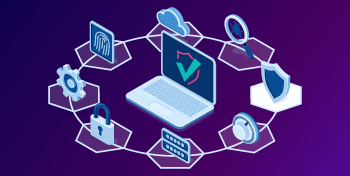If you consider that the loss of confidential data usually occurs through communication or in messengers, then you just need to urgently change the means of communication.
The best app for sharing encrypted messages
Messaging apps make it easy to connect with people around the world. However, with the advent of new ways to communicate and connect through technology, there are also new ways to violate your privacy and security. Private messages can potentially be read by third parties, organizations behind apps, and governments that collect personal information about their citizens. Facebook instagram, Snapchat, or Facebook Messenger don’t use end-to-end encryption, so your conversations and files may not be fully protected.
On the other hand, there are many chat apps offering messaging services that have improved their position on the security and privacy fronts by using end-to-end encryption. This measure prohibits anyone from seeing the contents of your messages other than you and the intended recipient. The best secure chat programs are not only becoming more popular, but also crucial in today’s technologically connected world.
Centralized service provider
Perhaps the most well-known and widely used secure messaging platform is the Signal app. Signal is a centralized service provider that runs an open source Protocol with end-to-end encryption (E2EE) if you don’t send your message as an SMS.
The great thing about Signal is that it can automatically benefit almost any participant without effort, especially if they use the Android operating system on their phone. By switching to Signal as the default app, you can continue sending SMS messages as before, but if you send a message to anyone else who has Signal on their phone, your messages will now be encrypted. In fact, this makes the service extremely profitable for all mobile device users.
In addition to being a top-notch phone app, it also works as a desktop app, and allows users to conduct encrypted voice and video chat, making it truly one of the best messengers. For users who want to get the most out of their investment and don’t care about their privacy, Signal becomes the obvious choice for everyone. Of course, even though Signal is very strong, it’s not the best app for everyone, as it doesn’t work as well as other messaging platforms, under certain circumstances, at least for now.
Second, if you need a more distributed platform, whether in a federated or P2P network, there are options for further obfuscation than just Signal.
As a kind of global argument, whether it’s international politics, down to homeowners ‘ associations, there is often a trade-off between centralizing and decentralizing these types of networks. Centralized platforms like Signal can evolve quickly and make as many improvements as they want. Decentralized platforms eventually become slower in overall movement and development speed, but benefit from being less susceptible to various types of attacks or interventions. Ultimately, they can both be quite useful, depending on the person or use case.
Federated service provider
Federated networks represent an intermediate middle ground between a centralized service provider and a full-fledged P2P provider. This works if you have multiple trusted independent third-party host servers. This includes yourself, since you can run your own server on a federated network. You can also choose which servers to connect to or not connect to. This hierarchical system tries to use the best elements of high performance and scalability, and provides an element of decentralization and privacy to its user base.
MintDice currently recommends using an app known as Element for this particular type of messaging offer. Element is based on the Matrix Protocol, which is actually the gold standard for secure, decentralized, open-source real-time data exchange. Element has all the features you’d expect from today’s messaging app. For those of you who use less secure apps like Skype or Telegram, this is a much better option from a technical point of view.
The disadvantage of Element or federated service providers is that while they try to get the best out of both branches in a centralized and decentralized world, they inevitably acquire some disadvantages. In order for nodes to accept new versions of the Protocol, they must be thoroughly tested.
Second, some network nodes may behave dishonestly, since anyone can join the network. This can create situations where they block certain types of messages, or other similar measures that are contrary to the spirit of a free and open platform.
However, by and large, Element is probably the best choice for those who take their privacy seriously, which depends on the daily use of the program.
Peer-to-peer messaging applications
P2P messaging apps may be one of the best in terms of security. What they may lack in some abilities, they will make up for in others. In P2P messaging apps, all data will be encrypted by default. And this E2EE can’t avoid, because it will be hard-coded into open source software. And being in a fully distributed network also ensures that communication is not disrupted.
However, this requires certain costs. First, software development on such platforms is known to be a difficult task, since it is necessary to reach a consensus. Hard forks and the like may be necessary to continue development, which may lead to political and philosophical disagreements about the right path of development. This can lead to a halt in innovation.
Also, since you have to manually connect to the network to report your presence, this requires two things. First, it broadcasts your IP address to users with whom you communicate, and who can provide attackers with information about you or your location. For this reason, it is better to use the P2P network only with users you trust, and not with unknown people.
Second, since your IP address must be constantly broadcast to the network, this can drain your devices ‘ battery faster than other apps, which is a minor drawback, but it’s worth considering nonetheless.
All of this suggests that P2P messaging apps will be among the best in the world that you can get for privacy. Currently, MintDice offers to choose one of two providers: Briar and Jami. It’s probably best for you to check out both of these apps, as they are both popular in terms of overall security, but one of the platforms may be better for you, depending on your feature requirements or design preferences. In the end, any of them should work fine.
Video / voice chat
Since the advent of the coronavirus, video chat apps like Zoom have been gaining popularity. Unfortunately, most of them are not perfect. The difference between the list of apps that we want to offer and the above-mentioned ones is that the first ones are mainly intended for text, but have video-type apps. Meanwhile, these programs are primarily designed for voice and video transmission, and have a secondary function of text integration.
The best voice and video messaging apps that MintDice recommends are the following:
- Linphone. SIP phone is an open source and free VOIP phone.
- Jitsi Meet. Free open source VOIP, conference call, and messenger.
- Mumble is an open-source, low-latency voice app designed for gamers (a great alternative to Discord).
With the video chat boom approaching, it’s good to help people make the right choices using the right technology so that network effects can adapt in the right direction in the future. Be sure to encourage your friends, family, and even business partners to use these apps for the greater good of both yourself and society.
Summarize
The proposed list is current as of October 2020. However, things are changing fast. Many secure messaging apps stop receiving updates, they may change their priorities, or they may be sold to larger businesses, resulting in an almost immediate conflict of interest. Depending on the level of privacy you need, you will need to check this periodically after you have the app installed.
Everything will change. The applications themselves, the threat models that exist in society, and the network of users who use the applications will constantly evolve, and you will have to adapt along with the rest, choosing between convenience and privacy.
Be safe, especially as cryptocurrency users. If possible, use E2EE and encourage everyone to do the same. By making small changes like the ones mentioned in this article, you can greatly influence global trends to demand greater privacy and security.
End of the second part.


